Bringing Civics to the Classroom With iCivics
Hello and welcome to another edition of the TESOL Games and Learning blog! In this month’s post, we’ll explore iCivics, a website of classroom-friendly games that teach students about the workings of government. Former U.S. Supreme Court Justice Sandra Day O’Connor founded iCivics in 2009 in response to what she saw as decreased civic engagement. Since then, iCivics has created a variety of games that give players an understanding of systems of government and help them learn more about the democratic process.
What’s great about iCivics is that the games are accompanied by a range of support materials, from lesson plans to entire curriculum units. This makes the website a solid selection for teachers who want to use games in the classroom but are unsure on how to get started.
iCivics has more than 20 games to choose from, and below are four that highlight the range of game styles and content iCivics has.
Argument Wars
Argument Wars positions the player as a lawyer arguing in front of the Supreme Court. Players can choose to argue one of nine historic cases, each representing a core constitutional right in the United States. The game deals in complex ideas and requires the players to make strategic decisions on how best to present their argument to the court, so it is best suited for more advanced language learners.
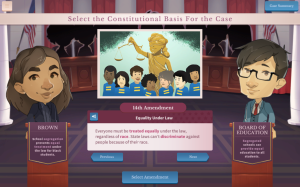
Argument Wars is a deck building game where players are provided a deck of cards from which they can draw. These cards then go into their hand and can then be used to help build their case or take actions that can help them win the argument.
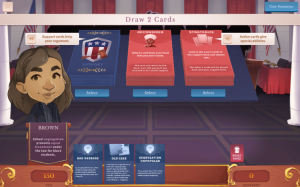
Counties Work
Counties Work is a basic simulation building game. Players are tasked with representing a local U.S. government office and assisting citizens in finding the resources they need. Along the way, players need to expand their county, make improvements, and do so within budget.
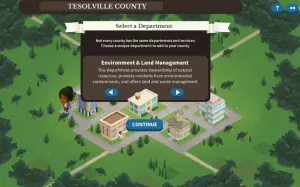
The slow pace and straightforward requests of the citizens make the game appropriate for intermediate level learners. Matching the requests of the citizens to the appropriate government resources creates an opportunity for players to look for context clues and exercise their vocabulary by seeing the connection between words such as tax and financial.
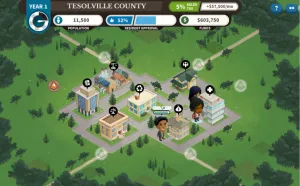
Immigration Nation
Immigration Nation is a sorting game that tasks players with sending ships entering immigration bay to the correct harbor. Each ship carries a passenger who provides the details of their story. After listening and reading the character’s story, players must decide to which harbor to send them.

Like all iCivics games, players are supported with interactive text that can be clicked to show the definition of new or unfamiliar words. The game’s simple layout, interactive text, and the straightforward writing in the characters’ stories make this one a solid choice for lower level students.
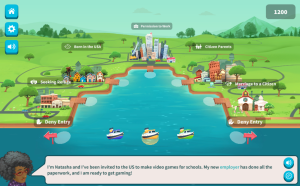
NewsFeed Defenders
NewsFeed Defenders is a resource management game that replicates a social media site where the player can level-up from a reader of the site to a content moderator. Along the way, they must investigate posts to determine their authenticity and accuracy. The overall challenge of the game is for players to balance the integrity, web traffic, and focus of the website.
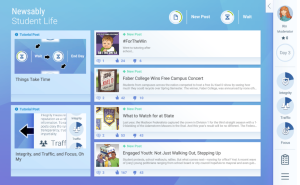
When players find fake posts, they can choose from a series of violations they can apply to the post. This makes NewsFeed Defender a solid class activity for students to practice their critical thinking skills and provides them a controlled exercise in checking their sources. The violations they learn in the game can easily be applied to sources they use when writing essays.
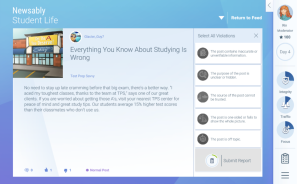
For teachers looking for a place to begin with games in the classroom, iCivics is a solid resource with a variety of game types for students to practice their reading, listening, and critical thinking skills, all while learning about what it takes to keep a democracy healthy.
Until next month, play more games!

